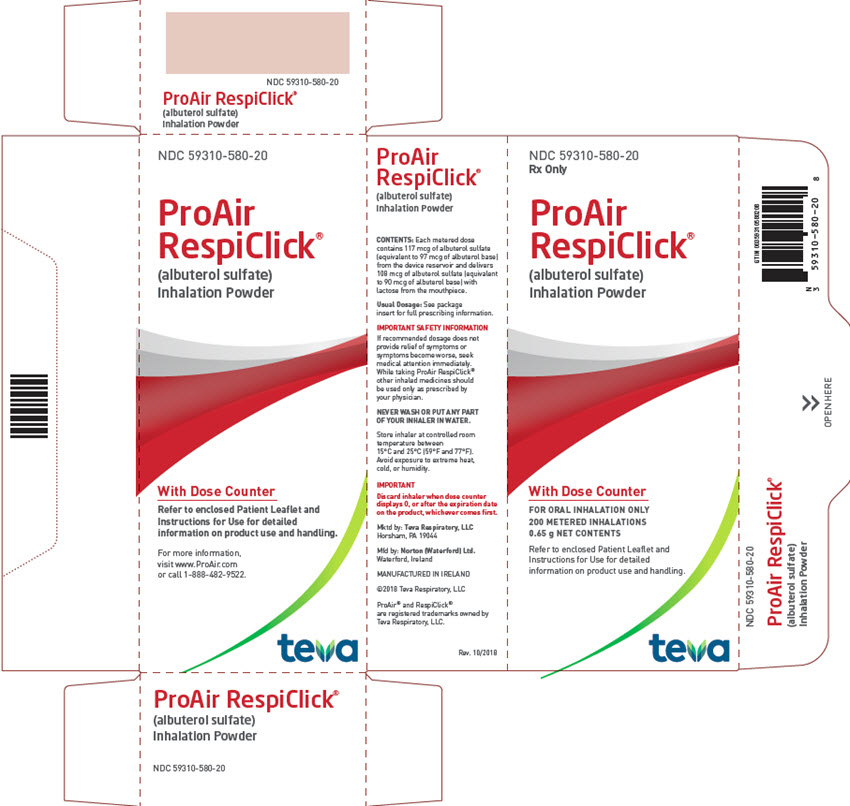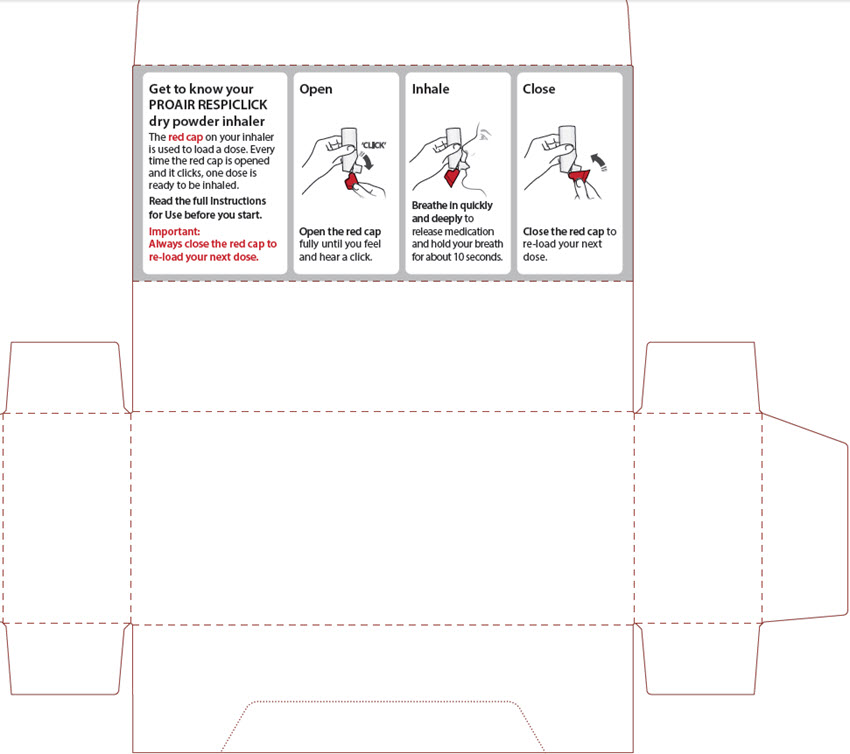ProAir RespiClick
Brand names: ProAir HFA, ProAir RespiClick, Proventil HFA, Ventolin HFA
Drug class: Adrenergic bronchodilatorsMedically reviewed by A Ras MD.
What is ProAir RespiClick?
ProAir RespiClick is a prescription medicine used in people 4 years of age and older to treat or prevent bronchospasm in people who have reversible obstructive airway disease and prevent exercise-induced bronchospasm.
It is not known if ProAir RespiClick is safe and effective in children under 4 years of age.
Description
The active ingredient of PROAIR RESPICLICK inhalation powder is albuterol sulfate, a racemic salt of albuterol. Albuterol sulfate is a beta2-adrenergic agonist. It has the chemical name α1-[(tert-butylamino) methyl]-4-hydroxy-m-xylene-α,α’-diol sulfate (2:1) (salt), and the following chemical structure:

The molecular weight of albuterol sulfate is 576.7, and the empirical formula is (C13H21NO3)2•H2SO4. Albuterol sulfate is a white to off-white crystalline powder. It is soluble in water and slightly soluble in ethanol. Albuterol sulfate is the official U.S. Adopted Name in the United States, and salbutamol sulfate is the recommended World Health Organization international nonproprietary name.
PROAIR RESPICLICK is an inhalation-driven, multi-dose inhalation powder (dry powder inhaler) for oral inhalation only. It contains a formulation blend of albuterol sulfate with alpha-lactose monohydrate. Each actuation provides a metered dose of 2.6 mg of the formulation containing 117 mcg of albuterol sulfate (equivalent to 97 mcg of albuterol base) and lactose from the device reservoir. Under standardized in vitro test conditions with fixed flow rates ranging from 58 to 71 L/min, and with a total air volume of 2 L, the PROAIR RESPICLICK inhaler delivers 108 mcg of albuterol sulfate (equivalent to 90 mcg of albuterol base) with lactose from the mouthpiece. The actual amount of drug delivered to the lung will depend on patient factors, such as inspiratory flow profile. In a study that investigated the peak inspiratory flow rate (PIFR) in asthma (n=27, ages 12 to 17 years old and n=50, ages 18 to 45 years old) and COPD (n=50, over 50 years old) patients, the mean PIFR achieved by subjects was >60 L/min (range = 31 to 110 L/min.), indicating that patients would be able to achieve the required inspiratory flow to operate the MDPI device correctly. The inhaler is provided for 200 actuations (inhalations).
Mechanism of Action
Albuterol sulfate is a beta2-adrenergic agonist. The pharmacologic effects of albuterol sulfate are attributable to activation of beta2-adrenergic receptors on airway smooth muscle. Activation of beta2-adrenergic receptors leads to the activation of adenylcyclase and to an increase in the intracellular concentration of cyclic-3′,5’‑adenosine monophosphate (cyclic AMP). This increase of cyclic AMP is associated with the activation of protein kinase A, which in turn inhibits the phosphorylation of myosin and lowers intracellular ionic calcium concentrations, resulting in muscle relaxation. Albuterol relaxes the smooth muscle of all airways, from the trachea to the terminal bronchioles. Albuterol acts as a functional antagonist to relax the airway irrespective of the spasmogen involved, thus protecting against all bronchoconstrictor challenges. Increased cyclic AMP concentrations are also associated with the inhibition of release of mediators from mast cells in the airway. While it is recognized that beta2-adrenergic receptors are the predominant receptors on bronchial smooth muscle, data indicate that there are beta-receptors in the human heart, 10% to 50% of which are cardiac beta2-adrenergic receptors. The precise function of these receptors has not been established [see Warnings and Precautions.
Albuterol has been shown in most controlled clinical trials to have more effect on the respiratory tract, in the form of bronchial smooth muscle relaxation, than isoproterenol at comparable doses while producing fewer cardiovascular effects. However, inhaled albuterol, like other beta-adrenergic agonist drugs, can produce a significant cardiovascular effect in some patients, as measured by pulse rate, blood pressure, symptoms, and/or electrocardiographic changes [see Warnings and Precautions.
Who should not use ProAir RespiClick?
Do not use ProAir RespiClick if you are allergic to albuterol sulfate, lactose, milk proteins, or any of the ingredients in ProAir RespiClick. See the end of this leaflet for a complete list of ingredients in ProAir RespiClick.
What should I tell my healthcare provider before using ProAir RespiClick?
Before using ProAir RespiClick, tell your doctor about all of your medical conditions, including if you:
- have heart problems
- have high blood pressure (hypertension)
- have convulsions (seizures)
- have thyroid problems
- have diabetes
- have low potassium levels in your blood
- are pregnant or plan to become pregnant. It is not known if ProAir RespiClick will harm your unborn baby. Talk to your doctor if you are pregnant or plan to become pregnant.
- are breastfeeding or plan to breastfeed. It is not known if ProAir RespiClick passes into your breast milk. Talk to your doctor about the best way to feed your baby if you are using ProAir RespiClick.
Tell your doctor about all the medicines you take, including prescription and over-the-counter medicines, vitamins, and herbal supplements.
ProAir RespiClick and other medicines may affect each other and cause side effects. ProAir RespiClick may affect the way other medicines work, and other medicines may affect the way ProAir RespiClick works.
Especially tell your doctor if you take:
- other inhaled medicines or asthma medicines
- digoxin
- monoamine oxidase inhibitors
- beta blocker medicines
- tricyclic antidepressants
- diuretics
Ask your doctor or pharmacist for a list of these medicines if you are not sure.
Know the medicines you take. Keep a list of them to show your doctor and pharmacist when you get a new medicine.
How should I use ProAir RespiClick?
- For detailed instructions on how to use the inhaler, see “Instructions for Use” at the end of this Patient Information.
- Use ProAir RespiClick exactly as your doctor tells you to use it.
- If your child needs to use ProAir RespiClick, watch your child closely to make sure your child uses the inhaler correctly. Your doctor will show you how your child should use ProAir RespiClick.
- Each dose of ProAir RespiClick should last up to 4 hours to 6 hours.
- Do not increase your dose or take extra doses of ProAir RespiClick without first talking to your doctor.
- Do not use a spacer or volume holding chamber with ProAir RespiClick.
- ProAir RespiClick does not need priming.
- Get medical help right away if ProAir RespiClick no longer helps your symptoms.
- Get medical help right away if your symptoms get worse or if you need to use your inhaler more often.
- While you are using ProAir RespiClick do not use other inhaled rescue medicines and asthma medicines unless your doctor tells you to do so.
- Call your doctor if your asthma symptoms like wheezing and trouble breathing become worse over a few hours or days. Your doctor may need to give you another medicine (for example, corticosteroids) to treat your symptoms.
What are the possible side effects of ProAir RespiClick?
ProAir RespiClick may cause serious side effects, including:
- worsening trouble breathing, coughing and wheezing (paradoxical bronchospasm). If this happens stop using ProAir RespiClick and call your doctor or get emergency help right away. Paradoxical bronchospasm is more likely to happen with your first use of a new asthma inhalation medicine.
- heart problems including faster heart rate and higher blood pressure
- possible death in people with asthma who use too much ProAir RespiClick
- allergic reactions. Call your doctor right away if you have the following symptoms of an allergic reaction:
- itchy skin
- rash
- swelling beneath your skin or in your throat
- worsening trouble breathing
- worsening of other medical problems in people who also use ProAir RespiClick including increases in blood sugar
- low potassium levels in your blood
The most common side effects of ProAir RespiClick include:
- back pain
- fast heart rate
- pain
- shakiness
- upset stomach
- nervousness
- sinus headache
- headache
- urinary tract infection
- dizziness
- your heart feels like it is pounding or racing (palpitations)
- sore throat
- runny nose
- chest pain
- vomiting
These are not all of the possible side effects of ProAir RespiClick.
Call your doctor for medical advice about side effects. You may report side effects to FDA at 1-800-FDA-1088.
General information about the safe and effective use of ProAir RespiClick
Medicines are sometimes prescribed for purposes other than those listed in a Patient Information leaflet. Do not use ProAir RespiClick for a condition for which it was not prescribed. Do not give ProAir RespiClick to other people, even if they have the same symptoms that you have. It may harm them.
You can ask your pharmacist or doctor for information about ProAir RespiClick that is written for health professionals.
For more information, go to www.MyProAir.com or call 1-888-482-9522.
How should I store ProAir RespiClick?
- Store ProAir RespiClick at room temperature between 59°F and 77°F (15°C and 25°C).
- Avoid exposure to extreme heat, cold, or humidity.
- Keep the cap on the inhaler closed during storage.
- Keep your ProAir RespiClick inhaler dry and clean at all times.
- Do not wash or put an part of your ProAir RespiClick inhaler in water. Replace your inhaler if washed or placed in water.
Keep ProAir RespiClick and all medicines out of the reach of children.
What are the ingredients in ProAir RespiClick?
Active ingredient: albuterol sulfate
Inactive ingredients: lactose (may contain milk proteins)
Instructions for use for ProAir RespiClick
ProAir RespiClick (prō´ār res-pē-klik)
(albuterol sulfate)
Inhalation powder
Your ProAir RespiClick Inhaler
When you are ready to use ProAir RespiClick for the first time, remove the ProAir RespiClick inhaler from the foil pouch.
There are 2 main parts of your ProAir RespiClick inhaler including:
- the white inhaler with the mouthpiece. See Figure A.
- the red cap that covers the mouthpiece of the inhaler. See Figure A.
There is a dose counter in the back of the inhaler with a viewing window that shows you how many doses of medicine you have left. See Figure A.
 Figure A
Figure A
- Your ProAir RespiClick inhaler contains 200 doses (inhalations). See Figure B.
- The dose counter shows the number of doses left in your inhaler.
- When there are 20 doses left, the dose counter will change to red, and you should refill your prescription or ask your doctor for another prescription.
- When the dose counter displays ‘0,’ your inhaler is empty, and you should stop using the inhaler and throw it away. See Figure B.
 Figure B
Figure B
IMPORTANT:
- Always close the cap after each inhalation so your inhaler will be ready for you to take your next dose. Do not open the cap unless you are ready for your next dose.
- You will hear a “click” sound when the cap is opened fully. If you do not hear the “click” sound the inhaler may not be activated to give you a dose of medicine.
- ProAir RespiClick does not have an activation button or medicine canister. When you open the cap, a dose of PROAIR will be activated for delivery of the medicine.
- In general, the technique for administering ProAir RespiClick to children is similar to that for adults. Children should use ProAir RespiClick under adult supervision, as instructed by the patient’s physician.
- Do not use a spacer or volume holding chamber with ProAir RespiClick. ProAir RespiClick does not need priming.
Using your ProAir RespiClick inhaler:
Important: Make sure the red cap is closed before you start using your inhaler.
Step 1. Open
- Hold the inhaler upright and open the red cap fully until you feel and hear a “click”. See Figure C.
- Each time you open the red cap and it “clicks”, a dose of ProAir RespiClick is ready to be inhaled.

Figure C
Remember:
- For the correct use of ProAir RespiClick, hold the inhaler upright as you open the red cap. See Figure D.
- Do not hold the inhaler in any other way as you open the red cap.
- Do not open the red cap until you are ready to take a dose of ProAir RespiClick.
 Figure D
Figure D
Step 2. Inhale
- Before you inhale, breathe out (exhale) through your mouth and push as much air from your lungs as you can. See Figure E.
- Do not exhale into the inhaler mouthpiece.

Figure E
- Put the mouthpiece in your mouth and close your lips tightly around it. See Figure F.

Figure F
- Do not block the vent above the mouthpiece with your lips or fingers. See Figure G.

Figure G
- Breathe in quickly and deeply through your mouth, to deliver the dose of medicine to your lungs.
- Remove the inhaler from your mouth.
- Hold your breath for about 10 seconds or for as long as you comfortably can.
- Your ProAir RespiClick inhaler delivers your dose of medicine as a very fine powder that you may or may not taste or feel. Do not take an extra dose from the inhaler even if you do not taste or feel the medicine.
Step 3. Close

Figure H
- Close the red cap firmly over the mouthpiece. See Figure H.
- Make sure you close the red cap after each inhalation so that the inhaler will be ready for your next dose.
- If you need another dose close the red cap and then repeat steps 1-3.

Storing your ProAir RespiClick inhaler
- Store ProAir RespiClick at room temperature between 59°F and 77°F (15°C and 25°C).
- Avoid exposure to extreme heat, cold, or humidity.
- Keep the red cap on the inhaler closed during storage.
- Keep your ProAir RespiClick inhaler dry and clean at all times.
- Do not wash or put any part of your ProAir RespiClick inhaler in water. Replace your inhaler if washed or placed in water.
- Keep your ProAir RespiClick inhaler and all medicines out of the reach of children.
Cleaning your ProAir RespiClick inhaler
- Do not wash or put any part of your ProAir RespiClick inhaler in water. Replace your inhaler if washed or placed in water.
- ProAir RespiClick contains a powder and must be kept clean and dry at all times.
- If the mouthpiece needs cleaning, gently wipe it with a dry cloth or tissue.
Replacing your ProAir RespiClick inhaler
- The dose counter on the back of your inhaler shows how many doses you have left. Do not try to change the numbers for the dose counter.
- When there are 20 doses left, the dose counter color will change to red, and you should refill your prescription or ask your doctor for another prescription.
- When the dose counter displays ‘0’ your ProAir RespiClick inhaler is empty, and you should stop using the inhaler and throw it away.
- Throw away your ProAir RespiClick inhaler 13 months after removing it from the foil pouch for the first time, when the dose counter displays ‘0’, or after the expiration date on the package, whichever comes first.
Important information
- Do not open the red cap unless you are taking a dose. Repeatedly opening and closing the cap without inhaling a dose will waste the medicine and may damage your inhaler.
- Your ProAir RespiClick inhaler contains dry powder so it is important that you do not blow or breathe into it.
- Do not take the inhaler apart.
Label
PACKAGE/LABEL DISPLAY PANEL PART 1 OF 2

- NDC 59310-580-20 Rx only
- TEVA
- ProAir RespiClick® (albuterol sulfate) Inhalation Powder With Dose Counter
- FOR ORAL INHALATION ONLY
- 200 METERED INHALATIONS 0.65 g NET CONTENTS
- Refer to enclosed Patient Leaflet and Instructions for Use for detailed information on product use and handling
PACKAGE/LABEL DISPLAY PANEL PART 2 OF 2
- NDC 59310-580-20 Rx only
- TEVA
- ProAir RespiClick® (albuterol sulfate) Inhalation Powder With Dose Counter
- FOR ORAL INHALATION ONLY
- 200 METERED INHALATIONS 0.65 g NET CONTENTS
- Refer to enclosed Patient Leaflet and Instructions for Use for detailed information on product use and handling

SRC: NLM .